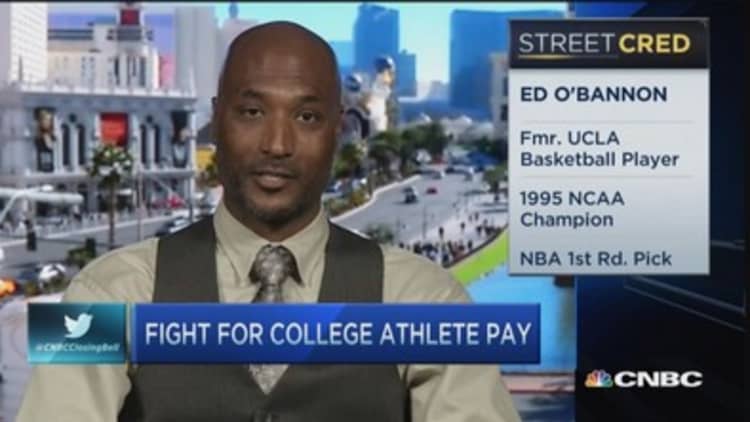
March Madness is in full swing, with the college basketball championship raking in big bucks for the NCAA. Former UCLA basketball star Ed O'Bannon thinks those players should also get paid.
O'Bannon, who currently has a lawsuit against the association, told CNBC's "Closing Bell" the athletes who play in the tournament "want to be there and are honored to play in that tournament.
"I just think that along with their possible degrees that they are getting, they should be compensated for it."
While the NCAA has 17 official corporate sponsors that have each paid the organization $10 million to $35 million, O'Bannon said the athletes' compensation doesn't have to be $1 million but just a "little something" to recognize that they are bringing in money to their schools.
Read More Sweet 16 a slam dunk for advertisers
Nearly five years ago, O'Bannon sued the NCAA, Electronic Arts and the Collegiate Licensing Company over the use of his name and image.
Lawyers for O'Bannon reached a $40 million settlement with EA and the Collegiate Licensing Company, which handles licensing rates for many universities. However, the case against the NCAA is still working its way through the courts.
Last August, a federal judge ruled the association violated antitrust law by prohibiting college athletes from being compensated for use of their names, images and likenesses. The court also ordered that schools be allowed to offer athletes full cost-of-attendance scholarships and put up to $5,000 per athlete, per year of eligibility, into a trust.
The NCAA has appealed the decision. Oral arguments were held last week in the case.
At the time it filed the appeal, the NCAA said it did not believe it violated antitrust laws.
"In its decision, the Court acknowledged that changes to the rules that govern college athletics would be better achieved outside the courtroom, and the NCAA continues to believe that the Association and its members are best positioned to evolve its rules and processes to better serve student-athletes," the NCAA's chief legal officer, Donald Remy, said in a statement last August.
Read More Pay for play: NCAA schools keep eye on legal cases
O'Bannon said the lawsuit was never about the money, it was about righting a wrong.
"If a company or someone was to use your likeness then you should be compensated for it, at the very least asked if your likeness can be used."
Since the legal action, the issue has grown from using a college athlete's likeness to whether he or she should be paid while in school.
For O'Bannon, the biggest thing is that the conversation is now happening.
"I feel strongly that if everyone involved can get together and talk about things they can work things out, whether it be pay when you are in school or collecting when your eligibility is up."
—CNBC's Steven Desaulniers, CNBC's Eric Chemi and Alicia Jessop contributed to this report.


